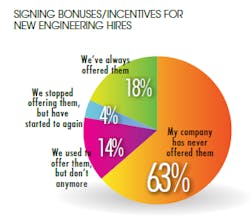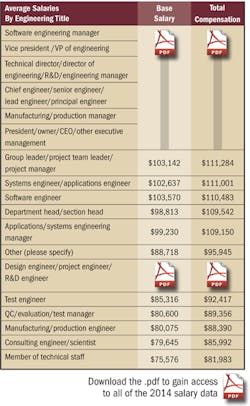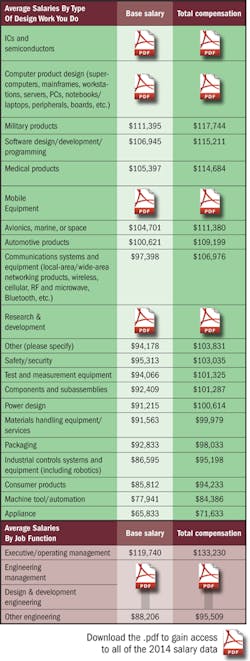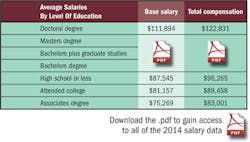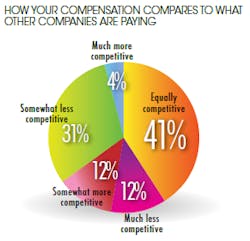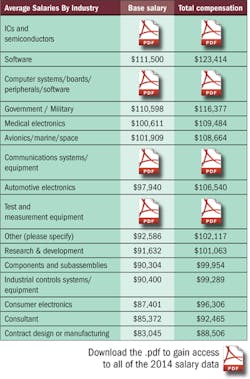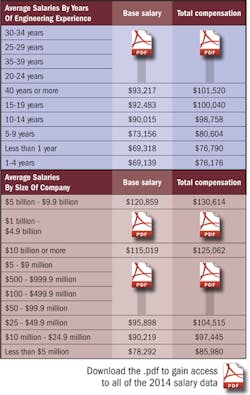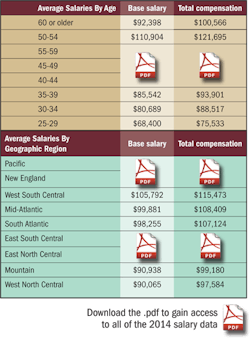2014 Engineering Salary Survey: Engineering By The Numbers
Engineers like certainty. There is, after all, nothing probabilistic about Ohm’s Law. However, even as career conditions show improvement following an intense recession and a less-than-vigorous recovery, engineers may have to learn to live with uncertainty.
"Second quarter of 2014 saw a net gain of 38,000 engineering jobs and the unemployment rate dropped to 1.6% - lowest since 2007"
Cash-rich corporations are less than eager to take on the fixed overhead that comes with rehiring—and thus continue to embrace offshore outsourcing.That said, the numbers in Electronic Design’s 12th Annual Salary & Opinion Survey should give engineers cause for optimism. According to this year’s nearly 3000 survey participants, the profession stands in relatively good health. Most engineers feel reasonably compensated, satisfied with their current position, and sufficiently challenged by their work. They are less fearful about losing their jobs than beforehand, too.
"Average total compensation is up slightly in 2014 - up 1.3%"
Employment Upswing
The employment picture for engineers definitely brightened in 2014. The second quarter of the year saw a net gain of 38,000 engineering jobs, and the unemployment rate dropped to 1.6%—its lowest since 2007. The number of employed engineers also returned to its 2013 average at the 300,000 level after dipping in the first quarter of the year. This is a pronounced improvement over 2013, when the unemployment rate for EEs crept back up to 4.8% after trending downward since its peak of 6.4% back in 2009. According to data from the U.S. Labor Department Bureau of Labor Statistics (BLS), however, engineering jobs actuallyAlso, more than half (52%) say a recruitment specialist or headhunter seeking engineering talent had approached them within the past year. This indicates that competition may be heating up for engineering skills and experience.
Some companies may be unprepared for this increasingly competitive market, especially if the recent hirer’s market made them complacent about working conditions. “My organization is experiencing record growth, but neglected the needs of employees so badly that more people were leaving than they were able to hire,” said one engineer. “Although changes have now been made to make employment more attractive here again, there is still a long way to go.”
Attrition is also forcing employers to up their game when it comes to recruitment and retention. “Our workforce is aging, so we need to attract and hang on to new employees to take the place of those who are approaching retirement age,” another engineer noted.
Nonetheless, while the job-market scales seem to be tipping in the favor of engineers, 70% of survey respondents said they don’t believe their company is as focused on employee retention this year versus last year. “Even though the positions are hard to fill, my company is still opting to replace senior engineers with young ones at a lower pay,” one respondent complained.
“This company doesn't care about their employees, which is evident by the constant turnover of staff,” echoed another. “The only reason the five of us who are 50+ years old don’t move on is the dearth of jobs for engineers our age.”
Salary Surge
After taking a bit of a hit in 2013, average total engineering compensation rebounded slightly in 2014—especially for engineers with management responsibility. Base salaries grew about 1.3% overall, while bonuses generally remained flat. Employers were also slightly more generous this year with stock options and other non-salary compensation, which rose about 7%.
Many survey respondents said that their incremental pay raises come at a fairly steep price, though. Employers are re-structuring compensation to make sure they get the outcomes they need from their engineering staffs. “There is a shift toward compensation based on goal-setting and achievements,” observed one. “We are being offered a fixed salary plus performance-based incentives,” said another. “The salary is about 60%, and the incentives are limited only by value addition.”
Because of these productivity pressures, engineers are working as hard as ever for their money, averaging 55½-hour work weeks—typically 40 hours in the office plus additional time at home, on call, and/or at other locations. “You’re expected to work 50+ hours per week with no extra pay, even if the project is on schedule,” lamented one engineer. “It’s just something you have to do if you want to advance to senior management.”
Despite slight increases in salary overall, only 40% of engineers believe their compensation is competitive with what other employers are paying for similar work, while 43% feel it’s less competitive.
Respondents also don’t think their salary gains are especially significant. “Salaries are not keeping up with inflation,” complained one engineer. “There’s not a lot of opportunity to move on to another position as companies prefer younger people with little experience. Companies know this and tend to use this fact against wage increases, advancement, and any other type of benefits.”
Guarded Optimism
Although wages have languished in recent years, engineers remain generally optimistic about their profession. “Engineers are always in demand,” said one survey respondent. “I know many well-paid engineers that have left my company for even better pay.”
A third respondent offered this perspective: “There are many engineering niches, each of which requires intense specialization. The general term ‘Electrical Engineer’ can refer to a person working on anything from chip lithography to high-power motor controls. With the number of these niches increasing every year, our field shows no signs of slowing down.”
But not everyone paints such a rosy outlook about the future. One respondent’s perspective was typical: “Due to the poor economy, fewer engineers are advancing. The large number of foreign-born engineering students graduating and wishing to remain in the U.S. is keeping salaries from rising. The rise of China’s economy in the world marketplace and the increase in the number of their own engineers is also putting a downward pressure on jobs and salaries.”
Perspectives also tend to vary by region because, simply put, compensation varies geographically. As we’ve seen in previous surveys, engineers on the West Coast top all wage earners with total incomes this year averaging $126,269 (up 3.4%). They’re followed by New England at $115,893 (up 2.4%) and the West South Central region—comprising Texas, Arkansas, Oklahoma, and Louisiana—at $115,473 (up 1.1%).
The type of firm also plays a substantial role in determining engineers’ compensation. Chip houses led the way in engineering pay again this year at $145,831—followed by software houses ($123,414), computer OEMs ($122,297), government/military contractors ($116,377) and medical electronics firms ($109,483).
An engineer’s level of education is another big factor. Engineers with bachelor’s degrees earned less than the average ($100,948), while those who’d tacked on graduate studies had incomes 8% higher at $109,063. Engineers with master’s degrees earned $115,424 in 2014, and those with doctorates averaged $122,831. Those differentials may not seem that great on an annual basis, given the high cost of a postbachelor’s education. But over the course of a career, the increased income can add up substantially.
More A Calling Than A Job?
Few jobs are as fun, challenging, and satisfying as engineering. And few offer such a wide range of opportunities. That’s why, like last year, about 90% of our survey respondents said they would recommend engineering as a career path to a youn“Engineering can be immensely rewarding, especially if you enjoy discovering how things work and how to make them better,” wrote one engineer. “Whether it is process development, product development, or software development, the ability to turn your vision into a real-world system is awe-inspiring.”
Another one put it this way: “If you have an inquisitive mind and good work ethic, engineering is a field that continues to advance by leaps and bounds. This relentless change challenges you to never stop learning. Plus, by getting involved in engineering societies such as IEEE, you can directly influence the standards and guidelines that future engineers will use to accomplish their designs. This can be deeply rewarding.”
One respondent finds it particularly enjoyable to participate in the development of new, young engineering talent. “I recently hired a BSME right out of school at $60k,” he explained. “This is the second one in the last three years. Our facility is small enough that I can work with and develop these new hires so they can move on to other opportunities within our parent company.”
That respondent was far from alone. “In today’s business environment, engineers are not respected—and company management does not have a good understanding of the development process,” wrote one such respondent. “Projects are often under-resourced, which sets up engineering teams for failure and frustration.”
Despite the presence of these voices, nearly 9 in 10 respondents say they enjoy their jobs—and an equally high number find their jobs at least somewhat challenging. “Engineering continues to provide intellectual challenge, a good income, and a path to progress into management for those with business acumen and interest,” asserted one of many respondents holding this point-of-view.
And, although respondents generally acknowledge the downward pressures on compensation, nearly two-thirds nonetheless believe that they are at least adequately compensated for their work. “Although sometimes it feels like it's lost some luster, engineering is still a high-paying field in which a person has a lot of options,” said one such respondent.
Whether due to job satisfaction or skepticism about conditions being better elsewhere, fewer than 10% of survey respondents say they’re actively seeking a new position. More than one in four, on the other hand, said they would definitely follow up if they heard about an interesting opportunity elsewhere, and another third said they’d listen if personally approached with an offer.
One engineer explained his approach to career management this way: “As an engineer, you are in charge of your career. You need to sacrifice and learn to work closely with different people. And you must continually learn about new elements of the industry and how they can impact your career.”
The challenges and sacrifices associated with a career in engineering prompted 37% of survey respondents to admit to considering leaving the profession altogether. Top reasons for making a switch included the desire to try something different (33%); to pursue other interests or opportunities (31%); to do something they perceived as more fulfilling or satisfying (27%); to make more money (24%); to do something less stressful (23%); or to start a business of their own (21%). Still, these amounted to sentiments rather than actions.
Running in Place
Staying current with new and emerging technologies remains a central challenge for engineers. Many find it nearly impossible to research and sift through the vast array of available information while focusing on the job at hand.“With the flood of information out there, it’s a challenge every day to decide what to trash and what to skim through,” said one respondent. “If I tried to take in all the information that comes my way, I wouldn’t be able to accomplish anything.”
Unfortunately, when it comes to keeping their skills and knowledge current, engineers increasingly find themselves on their own. Only about half say their company reimburses them for conferences and seminars (55%), while only 44% say they get money back from their employers for college tuition. Barely a third are reimbursed for engineering textbooks.
“Managers talk a lot about how they want you to keep current—but when you ask them to give you time off and pay for a two-day training seminar, they act like you just killed their dog,” joked one respondent.
About the Author
Jay McSherry
Jay McSherry is president of Butterflies & Castles, Inc., a full-service marketing communications company that provides market research, strategic planning and other marketing-related services to enterprises and publishers. Before forming B&C in 1991, he'd held senior marketing management positions at some of the major B2B publishing houses, including McGraw-Hill, CMP and IDG. Jay holds a BS degree in marketing from Fordham University. He can be reached at (201) 248.5080.

